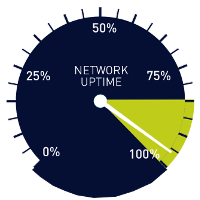 You've seen 98.9%, 99.9%, and even 100% server uptime labels on hosting sites. The first thought which comes up to people is, "Well, 99.9% sounds pretty well; 0.01% is no big deal," and they are right. Many people are missing because even if the server is reachable, it doesn't necessarily mean it's fully functional. So many other things can go wrong with a server. A 99.9% uptime sticker is no guarantee that your business won't face different problems while the server is up and running. Hosting providers calculate uptime in ways that aren't intuitive from a user's perspective, not considering certain website downtime.
You've seen 98.9%, 99.9%, and even 100% server uptime labels on hosting sites. The first thought which comes up to people is, "Well, 99.9% sounds pretty well; 0.01% is no big deal," and they are right. Many people are missing because even if the server is reachable, it doesn't necessarily mean it's fully functional. So many other things can go wrong with a server. A 99.9% uptime sticker is no guarantee that your business won't face different problems while the server is up and running. Hosting providers calculate uptime in ways that aren't intuitive from a user's perspective, not considering certain website downtime.
- First of all, not all downtime is counted. Scheduled maintenance is not part of the equation. Several hours of downtime is not what hosting companies would include. When monthly server uptime is calculated, such planned service interruptions are not included (deducted).
- Some, if not most, hosting providers tend to overlook shorter downtime periods. 3-5 minutes of unavailability are not considered significant and don't end up on the 99.9% sticker. You can see how multiple short downtime periods can make a difference at the end of the day.
- 0.01% means twice the trouble. 99.9% uptime means 8 hours and 45 minutes of downtime per year. So when you go down a notch to 98.9%, your calculated downtime goes up twice to 17 hours and 30 minutes.
- Resources are limited. "Unlimited" is just a nice way to sugarcoat "enough for the majority of common users." Your business might not be a common one, and demand might be high. There might be other significant sites sharing the same hosting hardware. At one point, it can all build up to an overload, resulting in poor loading times, broken transactions, and even a website. The server will remain online, but the performance won't meet your needs. Application monitoring is a good way to quickly and easily discover such problems.
100% uptime is not feasible. Eventually, something will go wrong. Network backbones will cause problems; power failures will happen, server software and hardware will fail now and then, and human error will always be important. So, my advice is: Don't try to find the ultimate provider, as it doesn't exist. Instead, find a decent provider with good server uptime and performance, 24-hour technical support, and frequent backups. Oh, why don't you go for a nice remote website monitoring service, just in case? It might be the best money you have ever spent.


 Copyright 2000-2026, WebSitePulse. All rights reserved.
Copyright 2000-2026, WebSitePulse. All rights reserved.